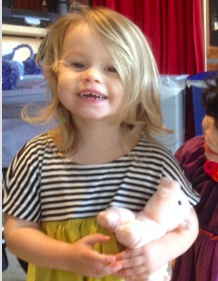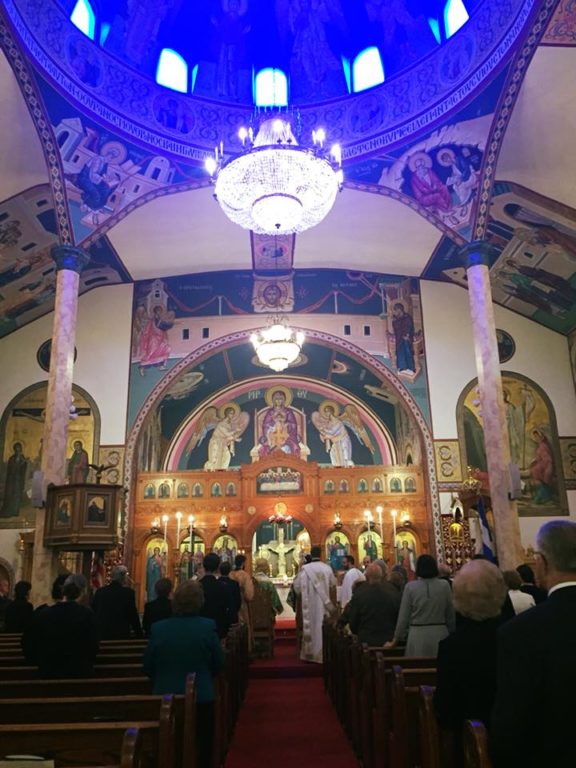
“We experienced radical welcome from our neighbors, the surprise of the new and unfamiliar, and the unity of celebrating the Eucharist.”
This week, Susan Butterworth, a local writer, teacher, singer, and lay minister, shares about a rich encounter of visiting neighboring churches in Cambridge inspired by the curiosity of her granddaughter. Susan Butterworth is a recent graduate of the Episcopal Divinity School and leads the weekly Song & Stillness: Taize at MIT prayer service in the MIT Chapel.
A recent post on the UniteBoston Facebook page asked, “Have you ever visited an Orthodox church?” This story came to my mind.
When my little granddaughter was a toddler, living in Cambridgeport, we’d go for long afternoon walks along the river, with the stroller. The Society of Saint John the Evangelist, an Episcopal monastic community, keeps the doors of their beautiful chapel on Memorial Drive open in the afternoons, for stillness, silence, and prayer. Anja and I and the stroller would take the little lift up from the street level to the chapel, and spend a few minutes of cool rest. She’d dip her little hand in the holy water as we entered. We’d light a candle and pray for her other grandmother, who had died when Anja was an infant. We’d look at the stained glass windows, and talk about the symbols and objects in the church. Stopping by the monastery church became part of our routine, and Anja got used to the idea that one could go into a church, visit, and rest.

At that time, Anja and her family were living very near the Sts. Constantine and Helen Greek Orthodox Church on Magazine Street. We passed the Greek Church, as we called it, every day walking to and from the Central Square T stop or the public library. Naturally, Anja would ask to go into the Greek Church.
I’m on my home turf in the Episcopal church, but I had never been in an Orthodox church, and I had no idea if the door was even open. Time and time again, I said no, when she asked to go inside the Greek Church. One week, however, I’d spent Saturday night with Anja while her parents went to a wedding, and we were out with the stroller early Sunday morning. It was summertime, the doors of the Greek Church were wide open, and the sound of chanting floated out into the warm air. We spontaneously locked the stroller to a pillar outside, climbed the big stone steps, went in and sat down in a pew near the back. We looked in awe at the gorgeous icons and imagery, and Anja was able to identify some of the saints and symbols she knew from the monastery church.

All this time the priest was chanting, and people were following along in their prayer books. Anja pulled out a prayer book, opened it, saw the Greek letters. “What’s he singing?” she asked. “ABCD?” And she began singing along, chanting ABCD, not particularly quietly. I looked around, embarrassed to be making noise in church, especially a church where I don’t know the customs or the language. Fortunately, this church seems to welcome children. People smiled at us. The couple in the pew behind us had a fussy baby with them.
For me, the unfamiliarity of the service fell away when we stood for the Lord’s Prayer. Now the incomprehensible language began to speak to my heart. Even though I didn’t understand the Greek, I knew we were praying a universal prayer together.
We will never forget what happened next. At an unseen signal, a group of children appeared from the back of the church, and began to line up. It seems that in this church, the custom is for the children to receive communion first. My active, impulsive, social two-year-old was loose in the pew next to me. “I’m going down there!” she announced, and in a flash, Anja was in line with the other children. I was at a loss. What to do? The answer came from a hospitable “little old Greek lady” in a front pew, who turned around and gestured for me to join Anja in line. “Okay,” I thought, “it looks like we’re going for communion.”
It was great to be up close, and watch the priest and deacon as they offered the bread and wine to the children, an act that was both familiar and unfamiliar at the same time. We watched as the priest dipped a long-handled spoon into the cup of wine, and as each child opened his or her mouth, the priest fed them the wine while the deacon held a big red napkin to each little chin. When it was our turn, however, Anja got cold feet. I opened my mouth for the wine. She clamped her mouth closed around her binky, and refused to open it. I was mumbling, “It’s okay, she doesn’t have to do it,” when the deacon calmly pulled out the binky and, quick as a wink, the priest popped the wine into the surprised O of her mouth. Smiling, the deacon handed me the binky, and Anja and I followed the other children down the chancel steps, where there was a big basket of bread. Following the lead of the others, I took a piece of bread and handed it to Anja. Then, we headed out the back door of the church, and I buckled her back into the stroller while she ate her bread.
“That priest gave me something!” she announced. Indeed, we experienced radical welcome from our neighbors, the surprise of the new and unfamiliar, the richness of the decoration and liturgy in the Orthodox church, and the unity of celebrating the Eucharist across denominational boundaries.
We continued down Magazine Street in the stroller, headed for Dana Park. We then passed Pentecostal Tabernacle, whose doors were open to the summer morning. We heard singing. We could see the worship team projected on a large screen through the open doors. “Can we go in there?” asked Anja.
“Another time,” I said. “Let’s go on the swings now.” But yes, I kept my promise, and in the spirit of knowing our neighbors, we did go to Pentecostal Tabernacle a couple of weeks later.
Susan Butterworth is a recent graduate of Episcopal Divinity School (M.Div. 2017). She is a writer, teacher, singer, and lay minister. She leads Song & Stillness: Taizé @ MIT, a weekly ecumenical service of contemplative Taizé prayer at Massachusetts Institute of Technology’s chapel. She also sings with Threshold Singers, a group that sings at hospice bedside. She teaches writing and literature to college undergraduates, and writes essays and literary reference articles.
Read similar articles:
- “Discovering the Gold” – Kelly Steinhaus describes the attitudes needed to see the gifts that others bring to the larger body of Christ.
- “One River, Many Streams” – Jacob Urena describes his experience during his first time at an Orthodox service
Leave a Reply